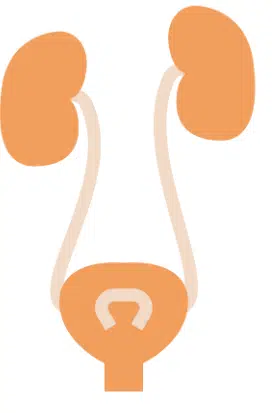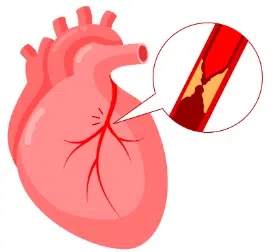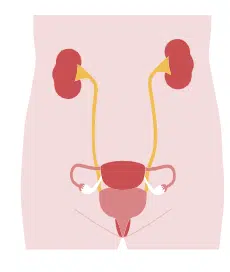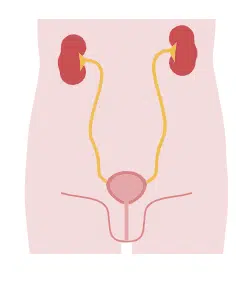Most people throughout the course of their lifetime will experience some type of problem with their genitourinary health. Genitourinary diseases (GD) or dysfunction involve the reproductive system and the urinary system (both male and female). Because of the proximity of these organs and the sharing of blood vessels and nerve function, genitourinary diseases are often interconnected in the treatment of disease and prevention.
Disease involving the kidneys is generally rare however, as rates of obesity, hypertension, and diabetes have increased over the past few decades, the rate of kidney disease has increased. What is the connection?
All are classified as cardiovascular diseases. This means they involve disease of the heart or blood vessels, specifically, the interruption of blood flow to the heart, brain, or body.
Obesity can hinder blood flow structurally and also by fatty deposits in the arteries.
Hypertension, the abnormally high pressure (or force) exerted by circulating blood against the walls of arteries and blood vessels, eventually causes damage to these walls leading to the hardening of the arteries. These hardened deposits or plaques result in a condition called atherosclerosis, a precursor to heart and kidney disease.
Diabetes, diagnosed by carrying higher than normal blood levels of glucose (sugar), when uncontrolled, leads to damaged blood vessels and poor circulation.
Genitourinary Diseases
Acute Renal Failure
Acute Tubular Necrosis
Benign Prostatic Hyperplasia (BPH)
Chronic Renal Failure
End Stage Renal Disease (ESRD)
Erectile Dysfunction
Fecal incontinence
Neurogenic Bladder
Overactive Bladder
Prolapse
Prostate Cancer
Renal Cancer
Sexual Transmitted Disease (STD)
Sickle Cell Nephropathy
Urinary Stress Incontinence
Urinary Tract Infection (UTI)
Yeast Infections
Chronic Kidney Disease (CKD) as a Genitourinary disease
As per the World Health Organization, Genitourinary diseases include kidney failure, which may be caused by diabetes or high blood pressure.
In order for the kidneys to function properly, meaning continue to filter wastes and rid the body of excess fluid, they must have a normal flow of fluid through the kidney ducts known as renal perfusion. Lack of proper circulation from a weakened heart causing low blood pressure can result in inadequate perfusion to the kidneys. Over time, this can cause permanent damage to the kidneys. This is one contributing factor to CKD.
However, the top 2 causes of CKD as well as end-stage renal disease (ESRD) are diabetes and high blood pressure.
Some other causes include advanced age, congenital defects, autoimmune disease, alcohol, and drug use, smoking, liver disease, infection, physical trauma, and cancer.
According to the NIH, “nearly 786,000 people in the United States are living with ESRD with 71% on dialysis and 29% with a kidney transplant”. CKD is most common among people ages 65 or older (38%), followed by people ages 45 to 64 (12%) and people ages 18 to 44 (6%).

Prevention of this genitourinary disease:
- If you have diabetes, see your doctor at least twice a year or be advised. Keep blood sugar levels under good control.
- If you have high blood pressure, take medications as prescribed, check your BP regularly and see your doctor at least once a year for a check-up.
- Avoid toxins to your kidneys including excessive painkillers, unknown herbal treatments, alcohol, smoking, and illicit drugs.
- Avoid dehydration by drinking the recommended amount of water daily.
- Follow a healthy low-fat diet including a minimum of 3 servings of fruit and 2 1/2 servings of non-starchy vegetables daily.
- Engage in regular exercise at least 5 days/week, a minimum of 60 minutes per day.
- Quit smoking and limit alcohol consumption as directed by your doctor.
- An estimated 46% of adults
with hypertension are unaware that they have the condition.
- Less than half of adults (42%) with hypertension are diagnosed and treated.
- Approximately 1 in 5 adults (21%) with hypertension have it under control.
Natural or Nutrition-Related Remedies:
- Incorporate anti-inflammatory foods into the diet. Include adequate Omega-3s.
- Use of essential oils in stress reduction.
- Breathing exercises.
- Anti-inflammatory Herbals: Ginseng, Ganoderma Lucidum, Ginkgo Biloba, and Gynostemma Pentaphyllum (Consult with your doctor first before starting any herbal or supplement therapy).

Other Common Genitourinary Diseases
Some of the other common genitourinary diseases include Urinary tract infections, urinary stress incontinence, and erectile dysfunction.
Urinary Tract Infection (UTI)
One of the most common genitourinary diseases among adults is urinary tract infection (UTI). They are usually caused by bacteria in feces entering the urethra. Fecal incontinence, therefore, is a contributor to UTIs.
Since women have a shorter urethra than men, they are more prone to infection as the bacteria have less distance to travel to the bladder.
UTIs can also be caused by a fungal infection, often yeast. For this reason, people with diabetes are at an increased risk for UTIs as well as hospitalizations.
Pregnancy and sexual activity can also increase the risk of UTI.
Prevention of this genitourinary disease:
- Do not hold urine in
- Drink adequate fluids daily (64 to 96 oz for most people)
- Avoid high sugary foods and drinks
- Control blood sugar as advised by your doctor
- Practice good hygiene in the bathroom (wipe front to back) and avoid baths while submerged if history of UTIs
- Treat vaginal yeast infections right away under your doctor’s care.
- Probiotics (low or no sugar added)
Natural or Nutrition-Related Remedies:
- Unknown, however, cranberry juice has been said to alleviate symptoms.
- Avoid spicy foods, alcohol, caffeine, and citrus fruits to avoid worsening symptoms.

Urinary Stress Incontinence as a Genitourinary Disease
This is another one of the common genitourinary diseases. Urinary stress incontinence is when urine is lost involuntarily when there is physical pressure on the bladder due to laughing, coughing, sneezing, lifting something heavy, or bending over.
This is different from having an overactive bladder. It’s caused by the weakening of muscles and tissues that support the urethra and urinary sphincter (the muscle that controls the release of urine).
Contributing factors include obesity, chronic coughing due to smoking or asthma, high-impact activities, and sports, chronic constipation, history of vaginal births or pelvic floor surgery, and age.
Prevention of this genitourinary disease:
- Keep body weight within a normal range while reducing abdominal fat.
- Manage chronic coughing to the best of your ability by consulting with your doctor.
- Practice pelvic floor exercises (Kegel exercises) regularly.
- Smoking cessation
- Avoid caffeine and alcohol.
- Manage constipation quickly and follow a high-fiber diet to avoid it.
Natural or Nutrition-Related Remedies:
None has been clinically proven.

Erectile Dysfunction (ED)
Erectile dysfunction (ED) is one of the common genitourinary diseases in men. ED is the inability to get or keep an erection and the causes are numerous. Many, however, are preventable and curable. They usually affect men between the ages of 40 and 70 and are often not treated due to a lack of follow-up with their family physician.
As obesity, diabetes, and hypertension are on the rise, the prevalence of ED follows.
Therefore, lifestyle changes such as smoking and alcohol cessation, regular exercise, and following a healthy diet can prevent ED in many cases. It’s always recommended to see your doctor right away when you experience any problems with sexual function.
Prevention of this genitourinary disease:
- Control blood pressure
- Lower cholesterol levels with diet and exercise
- Control blood sugar levels (with a history of diabetes)
- Stop smoking and limit or avoid alcohol consumption.
- Maintain body weight within the normal range (BMI >18<25)
- Consult with your doctor about when to start getting prostate exams. The American Cancer Society recommends starting this exam at age 50 or age 40 if you have more than one close relative with a history of prostate cancer.
Natural or Nutrition-Related Remedies:
None has been clinically proven.
Erectile Dysfunction (ED) – Common Causes
Heart disease
Clogged blood vessels
(atherosclerosis)
High cholesterol
High blood pressure
Diabetes
Obesity
Metabolic syndrome — a
condition involving
increased blood pressure,
high insulin levels, body
fat around the waist and
high cholesterol
Parkinson’s disease
Multiple sclerosis
Certain prescription
medications
Tobacco use
Peyronie’s disease —
development of scar
tissue inside the penis
Alcoholism and other
forms of substance abuse
Sleep disorders
Treatments for prostate
cancer or enlarged
prostate
Surgeries or injuries that
affect the pelvic area or
spinal cord
Low testosterone
The Final Words
Cardiovascular as well as urinary-related conditions are often accompanied by some type of sexual dysfunction or disorder even when not physiological. Carrying the psychological burden of managing a chronic condition is a major cause of depression which can lead to a lack of libido.
As the use of bottom surgery to alleviate gender dysphoria becomes common, there will likely be more complicated genitourinary problems creating a need for more individualized diagnoses and treatments.
These are just some of the reasons why the prevention of genitourinary diseases is so important. Having annual visits with your doctor can help prevent genitourinary disease.
References
- What causes UTIs & UI? | NICHD – Eunice Kennedy Shriver National Institute of Child Health and Human Development (nih.gov)
- Genitourinary System – an overview | ScienceDirect Topics
- Kidney Disease Statistics for the United States | NIDDK (nih.gov)
- Hypertension (who.int)
- Acute kidney failure – Symptoms and causes – Mayo Clinic
- Herbal Medicine for Cardiovascular Diseases: Efficacy, Mechanisms, and Safety – PMC (nih.gov)
- Stress incontinence – Symptoms and causes – Mayo Clinic
- Erectile dysfunction – Symptoms and causes – Mayo Clinic
- Transfeminine Bottom Surgery Risks and Safety | ASPS (plasticsurgery.org)

Cheryl Robinson
Related Posts

Genitourinary Syndrome Of Menopause-Do Women Know?
What is Genitourinary Syndrome of Menopause? The genitourinary syndrome of menopause is a condition that can go on for years, hidden, due to embarrassment

CKD, Calcium And Bone Disease: A Bone To Pick
Chronic Kidney Disease, CKD & Bone disease – “I want to have strong bones, but my labs keep showing that my calcium level is low.

Hyperkalemia in CKD – Have you gone bananas?
Eat one of these a day… any questions? Ok, if you are a nurse or a dietitian, you are familiar with this practice of

Diabetes Doctor Answers – Do I Really Need Insulin?
Insulin, this word creates panic among almost all diabetic patients (whether Type 1 or Type 2 Diabetes). We all know that type 1 diabetics need

Mind Over Matter : Help Your Brain Heal Your Heart
Mind over matter? February is designated as American Heart Month! So, let us take care of our heart health. Here are some exciting tips on

Heart Health Month 2023 – How To Be Heart Healthy this Valentine’s Day
Valentine’s Day 2023 is approaching, and love is in the air! The symbol for this emotionally influenced holiday is the heart, so it is only

